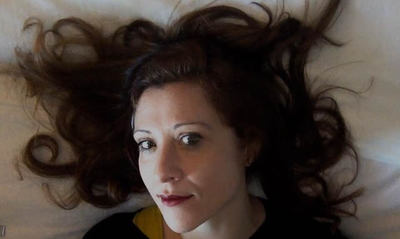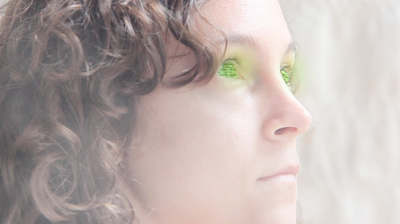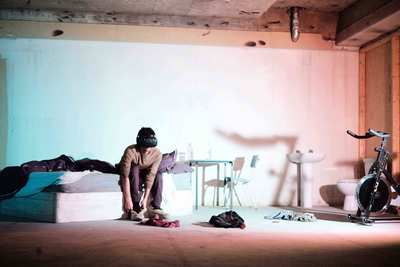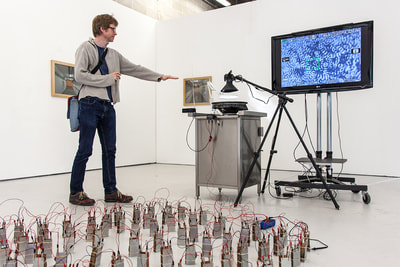When Hayles coined the term “Posthuman”, she postulated that our concept of consciousness increasingly relies on machine support, the subordination of body under mind, pointing to the blurring of lines between machine and human. Joshua Labare points to the role of feminist and queer theory in this context. Resonating concepts of Haraway’s Cyborg manifesto, artists continue to question effects of technological impact on society, on concepts of gender, intimacy, communication. Since Jeffrey Deitch’s exhibition “Posthuman”, 25 years ago, artists continue to question ideas of technology as prosthetic, as conscious entity, as social game changer - in ever challenging ways.
With FLUX: Post-/Human, we ask about the present and future of the limits between human and technology in Media Art. Is consciousness really an epiphenomenon, its embodiment a happy accident or can it be a human creation? How does the synthesis between human and machine affect our perception of self and other? Where is posthuman Art heading? Curated by Oliver Gingrich, FLUX invites an array of contemporary artists working across different media to discuss Post-/Human practices.
With FLUX: Post-/Human, we ask about the present and future of the limits between human and technology in Media Art. Is consciousness really an epiphenomenon, its embodiment a happy accident or can it be a human creation? How does the synthesis between human and machine affect our perception of self and other? Where is posthuman Art heading? Curated by Oliver Gingrich, FLUX invites an array of contemporary artists working across different media to discuss Post-/Human practices.
ABOUT THE ARTISTS
MARK FARID
Mark Farid is a conceptual artist who examines the formation of our projected-self, and how our constructed identity is shaped by social expectations.
Mark graduated from Kingston University, London with a first class (Hons) degree in Fine Art in 2014 and has since given talks and participated in group and solo exhibitions in England, France, Germany, Denmark, UAE, and Japan. Farid gave a TED talk in 2017 about his first two projects Data Shadow (2015) and Poisonous Antidote (2016) and took part in the Sundance New Frontier Program in 2016 for an on-going project Seeing-I (2019).
Farid has appeared on Sky News, Fox News, BBC Radio 4, the Guardian, the Independent, the New Statesman and has written about his work for the Telegraph. @markforid
www.markfarid.com
ANNA TROISI
Anna Troisi is a digital artist, programmer, performer, experimental electronic musician, composer, instruments builder, data fetishist and fine artist. She has a background in computer science, music, computer music, neuroscience, and a PhD in nanotechnologies.
Anna’s research strand is part of the unit's well-established area of expertise addressing how gender inequalities and gendered social differences are constructed. Her major aim is to use the creative digital/sound arts to challenge stereotypes and provide positive alternatives. Her last performance OB-Scene is very part of a wider movement of women and technology named XenoFeminism (XF) that is emerging. It introduces the idea of techno-alienation and focuses around the concept of other/diverse desires, new forms of desiring, experiencing something other. Anna recently embraced this new form of feminism for the fluid, the non-human, the diverse. Her approach to cybernetics is intentionally very blurred: the anthropocentrism is substituted by the idea that human agency has some echoes in nonhuman nature and vice versa.
http://annatroisi.org
RACHAEL NEE
Rachael Nee is an artist who works around ideas concerning energy, entropy and matter. She holds an MA Fine Art with Distinction from UAL: Chelsea School of Art and Design. Her recent projects include collaborating with CERN, Switzerland, where she was artist-in-residence for their High School Teachers Programme in 2017. In 2018 she was awarded a Heritage Lottery Funded art residency, researching women who worked in electronic manufacturing and industry, from conscription in 1916.
www.rachaelnee.art
KRISTINA PULEJKOVA
Kristina Pulejkova (1988, Skopje, Macedonia) is a London-based multimedia artist who works at the intersection of art, science and technology. Working across film, sound and installation, her work explores how the use of technology might lead to greater forms of sustainability and humannature relationships.
Her main subjects of interest are time, ecosystems and mechanisms, looking for connections between man and machine, the organic and the mechanical. Pulejkova’s recent research focuses around ideas of the posthuman. By looking at human-computer interfaces, the research aims to redefine the body and the self into an extended self through technology, and explore how this prosthetic relationship might evolve into a symbiotic one in the near future.
http://www.kristinapulejkova.com/
Mark Farid is a conceptual artist who examines the formation of our projected-self, and how our constructed identity is shaped by social expectations.
Mark graduated from Kingston University, London with a first class (Hons) degree in Fine Art in 2014 and has since given talks and participated in group and solo exhibitions in England, France, Germany, Denmark, UAE, and Japan. Farid gave a TED talk in 2017 about his first two projects Data Shadow (2015) and Poisonous Antidote (2016) and took part in the Sundance New Frontier Program in 2016 for an on-going project Seeing-I (2019).
Farid has appeared on Sky News, Fox News, BBC Radio 4, the Guardian, the Independent, the New Statesman and has written about his work for the Telegraph. @markforid
www.markfarid.com
ANNA TROISI
Anna Troisi is a digital artist, programmer, performer, experimental electronic musician, composer, instruments builder, data fetishist and fine artist. She has a background in computer science, music, computer music, neuroscience, and a PhD in nanotechnologies.
Anna’s research strand is part of the unit's well-established area of expertise addressing how gender inequalities and gendered social differences are constructed. Her major aim is to use the creative digital/sound arts to challenge stereotypes and provide positive alternatives. Her last performance OB-Scene is very part of a wider movement of women and technology named XenoFeminism (XF) that is emerging. It introduces the idea of techno-alienation and focuses around the concept of other/diverse desires, new forms of desiring, experiencing something other. Anna recently embraced this new form of feminism for the fluid, the non-human, the diverse. Her approach to cybernetics is intentionally very blurred: the anthropocentrism is substituted by the idea that human agency has some echoes in nonhuman nature and vice versa.
http://annatroisi.org
RACHAEL NEE
Rachael Nee is an artist who works around ideas concerning energy, entropy and matter. She holds an MA Fine Art with Distinction from UAL: Chelsea School of Art and Design. Her recent projects include collaborating with CERN, Switzerland, where she was artist-in-residence for their High School Teachers Programme in 2017. In 2018 she was awarded a Heritage Lottery Funded art residency, researching women who worked in electronic manufacturing and industry, from conscription in 1916.
www.rachaelnee.art
KRISTINA PULEJKOVA
Kristina Pulejkova (1988, Skopje, Macedonia) is a London-based multimedia artist who works at the intersection of art, science and technology. Working across film, sound and installation, her work explores how the use of technology might lead to greater forms of sustainability and humannature relationships.
Her main subjects of interest are time, ecosystems and mechanisms, looking for connections between man and machine, the organic and the mechanical. Pulejkova’s recent research focuses around ideas of the posthuman. By looking at human-computer interfaces, the research aims to redefine the body and the self into an extended self through technology, and explore how this prosthetic relationship might evolve into a symbiotic one in the near future.
http://www.kristinapulejkova.com/





